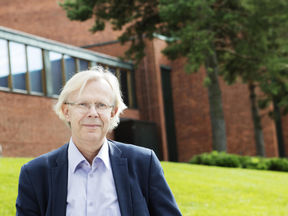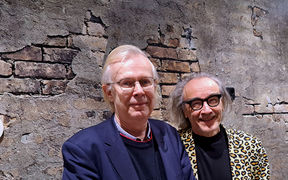Bioinspired colours and adaptable materials - Professor Olli Ikkala's third EU project builds on living systems

Department of Applied Physics Professor Olli Ikkala received his third Advanced Grant from the European Research Council (ERC) on 11 April 2024. The funding amounts to €2.5 million and the project will run for five years.
The European Research Council awards Advanced Grants to experienced researchers of outstanding merit for exceptional and unconventional scientific breakthroughs. Ikkala is the first person at Aalto University to have received the Advanced Grant three times, and only the second in Finland.
Ikkala's project explores nature-inspired materials that increasingly have the properties of living systems.
‘The properties of everyday materials remain unchanged, i.e., they are in a state of equilibrium. But living systems are not in equilibrium and are therefore able to adapt to new conditions,’ he says.
The state of living systems is governed by a feedback loop called homeostasis. Ikkala’s project develops materials that can be brought out of equilibrium by external stimuli.
‘By feedback, we keep materials in the desired state and regulate their properties,’ says Ikkala.
Olli IkkalaIt would be revolutionary if soft sensors and soft robotics could be controlled by small batteries instead of large power supplies
In materials, feedback is still a poorly understood and difficult issue. The actual application areas are still a question mark–even for Ikkala.
‘I could imagine that “autonomous” materials will be needed in future robotics and biomedicine, such as automated drug delivery. In particular, soft robotics will be based on functional materials, rather than the levers and joints of today's robots. It would be revolutionary if soft sensors and soft robotics could be controlled by small batteries instead of large power supplies, i.e., requiring only small stimuli,’ Ikkala says.
Adaptable colours
Many of the materials used in the project are gels, which are water-based, elastic and malleable materials with a polymer network inside. Gels are similar to soft tissue in living things. The project will also incorporate nanoclay and cellulose, both of which are bioderived nanomaterials.
‘If the distance of the nanoclay or nanocellulose in the gel matches the wavelength of light, all possible colours can be created by reflecting light. With external stimuli, the colour and reflectivity of the light change with, for example, stretching, electric voltage or light.’
Olli IkkalaCould it be possible in the future to change the structural colours, for example with light? Could colours adapt like in biology?
Ikkala’s project is broadly related to reducing the harmful pollutants associated with the resource-intensive dye and pigment industry, which has just received hefty restrictions from the EU. Classically, colour is based on the absorption of light. Structural colours based on light reflection are being extensively developed as part of the research into sustainable development.
‘We are trying to get to the next level. Could it be possible in the future to change the structural colours, for example with light? Could colours adapt like in biology?’ he says.
Inspiration also from music
As a young man, Ikkala also studied organ playing. He is particularly interested in French baroque, which he still plays every day. Composers close to him include Couperin, de Grigny, Clerambault and Nivern.
‘I think music helps to calm the mind and insights come to mind intuitively. Bach's music is often mathematical. You have to play it with feeling, but it moves like a train.’
‘French baroque, on the other hand, must be played elegantly with good taste, or 'avec bon goût.’ To find it, you need to know the culture–but you can't learn it directly from textbooks. I think my organ teacher jokingly said that the appropriate attitude to interpretation is to imagine the Le Roi Soleil in a little morning dress. He might take a small side step now and then, but the crowd behind him will force him on. So French baroque music sways within the bounds of good taste, and that makes it very elegant and lively,’ Ikkala says.
Olli IkkalaI think music helps to calm the mind and insights come to mind intuitively
Ikkala's previous ERC project succeeded in producing materials that demonstrated simple forms of learning. His research group is part of the LIBER Centre of Excellence, which specialises in the broader field of combining materials with living systems and soft robotics.
‘The funding from the European Research Council has been instrumental in enabling top-level international recruitment and important collaborations that would otherwise be difficult to achieve. This project also combines expertise from Germany and France,’ says Ikkala.
Contact information:
Olli Ikkala and Esa Saarinen found a common thread in baroque music and lecturing
Olli Ikkala will continue his research on nature-inspired materials and will find himself again as an organist after his busy research career. Esa Saarinen, on the other hand, continued to lecture the Philosophy and Systems Thinking (Filosofia ja systeemiajattelu) course to packed halls this spring. When they met, they discussed the organ and the atmosphere of the lectures.

Read more news

Learning to slow down: cold-water swimming benefits explored in new study
Swimming in cold water offers a temporal slowdown, promoting stress management and mental clarity that lingers long after the experience, says research from Finland.
The proxy server for remote access to e-resources is changing
If you have problems using e-resources, try accessing the e-resource using VPN connection.
A sustainable city is also age-friendly
Cities must involve older adults more strongly in the planning of the urban environment.






